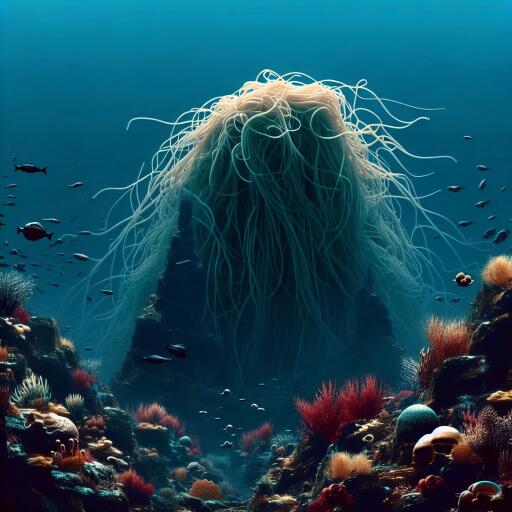
‘Flying Spaghetti Monster’ Witnessed in the Depths of a Newly Discovered Underwater Mountain
In a revealing oceanographic mission, the Schmidt Ocean Institute, based in California, has illuminated the existence of a monumental underwater mountain deep in the Pacific Ocean, approximately 900 miles from the coast of Chile. This hidden leviathan of the deep stands at a staggering height of 1.9 miles, towering over Mount Olympus and yet not quite reaching the majestic heights of Mount Fuji. To put this in perspective, imagine stacking four of Dubai’s Burj Khalifa, the tallest skyscraper in the world, on top of one another.
During a 28-day voyage on the R/V Falkor, oceanographers embarked on a thrilling exploration, employing advanced sonar technology to map this leviathan of the sea floor. The echoes from these sound waves, bouncing back from the ocean’s abyss, afforded the team a glimpse into a breathtaking and previously uncharted seamount landscape.
The significance of these findings extends beyond pure discovery. Jyotika Virmani, a leading figure at the institute, emphasized that only a fraction of the world’s ocean floor has been mapped with this level of precision, despite oceans covering 71% of Earth’s surface. This underlines a considerable gap in our understanding of deep-sea topographies and the ecosystems they support.
This newly identified region is brimming with life, housing sponge gardens, millennia-old corals, and a plethora of rare marine life forms. Among the expedition’s most remarkable encounters were the ghostlike Casper octopus and two Bathyphysa siphonophores, evocatively nicknamed ‘flying spaghetti monsters’ due to their unique morphology. Additionally, the team captured footage of the elusive Promachoteuthis squid, a creature seldom seen alive.
The potential for this area to be designated as the world’s first high seas marine protected area under a new UN treaty, awaiting ratification in 2023, could represent a monumental step forward in ocean conservation. Such initiatives are crucial for protecting these complex ecosystems, which are key to the health of our planet’s oceans and the rich biodiversity they nurture.
The discovery of this seamount and its ecosystems is not just a win for oceanography but underscores the urgent need for global marine protection efforts. The intricate balance of life found here plays a vital role in the health of marine ecosystems, supporting species that depend on its unique habitats for survival.
Moreover, the possible new species discovered could hold secrets to advancements in medicine, resilience to climate change, and more effective ecosystem management strategies. As we venture further into these unexplored frontiers, the interconnectedness of Earth’s ecosystems becomes ever more apparent, amplifying the call to protect these vital marine environments.
The findings from these expeditions are poised to contribute significantly to the Ocean Census, aiming to identify 100,000 unknown marine species over the next decade. This ambitious project seeks to enhance our understanding and preservation of the planet’s deep-sea ecosystems, revealing the untold stories hidden beneath the waves.
In closing, the profound discoveries from these deep-sea endeavors offer a compelling reminder of the mysteries and scientific discoveries that await us, not just among the stars above but in the vast unknowns of our own planet’s oceans. The groundwork laid by missions such as these paves the way for future exploration and conservation, ensuring the wonders of the deep remain a source of fascination and vital ecological importance for generations to come.





Leave a Reply